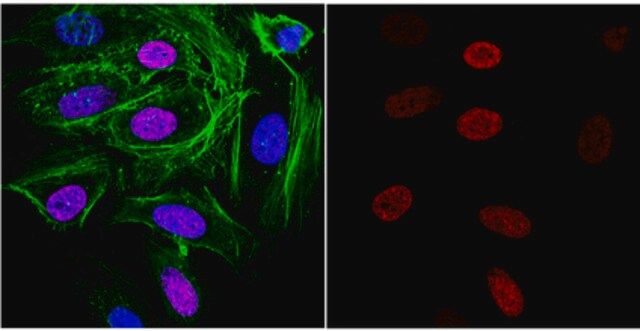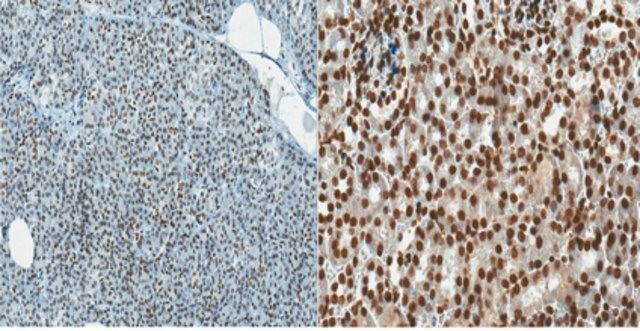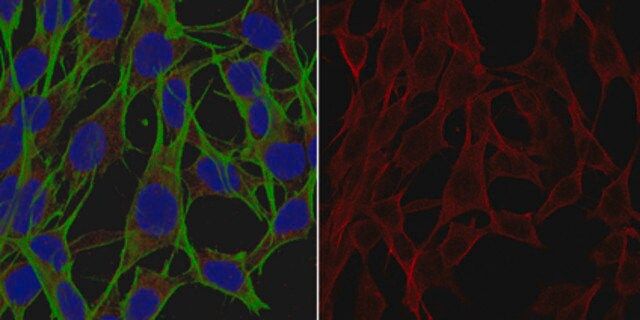产品说明
一般描述
Single-stranded guanine (G)-rich DNA can form stable secondary structures called G-quadruplexes (G-tetrads or G4). Four guanine bases can associate through Hoogsteen hydrogen bonding to form a square planar structure called a guanine tetrad (G-tetrad), and two or more G-tetrads can stack on top of each other to form a G-quadruplex. The quadruplex structure is further stabilized by the presence of a cation, especially potassium, which sits in a central channel between each pair of tetrads. A DNA G-tetrad can be formed within one DNA strand (intramolecular), between two DNA strands (bimolecular), or four DNA strands (tetramolecular). G4 DNA can arise anywhere in the genome where sufficiently long stretches of single-stranded G-rich DNA are exposed during replication, transcription or recombination. Chemical analysis of quadruplex-forming oligonucleotides has revealed the existence of a plethora of dynamic quadruplex structures with varying stabilities. The diverse nature of G4 DNA structures makes it an appealing topic in molecular biomedical research.
特异性
Target DNA structure is not species-specific.
Clone 1H6 binds both tetramolecular and unimolecular (intramolecular) DNA G-quadruplex (G4) structures without sequence specificity, while exhibiting significantly lower affinity toward tetramolecular RNA structure or a triplex DNA structure, and little to no affinity toward either non-G4 ssDNA or ddDNA. However, clone 1H6 does not seem to bind the [AGGG(TTAGGG)3] unimolecular G4 structure, indicating a broad selectivity toward many, but not all, DNA G4 structures (Henderson, A., et al. (2014). Nucleic Acids Res. 42(2):860-869).
免疫原
KLH-conjugated G-quadruplex DNA derived from oligonucleotides with telomeric repeats.
应用
Research Sub Category
Nuclear Receptors
Immunohistochemistry Analysis: A 1:50-250 dilution from a representative lot detected DNA G-quadruplex (G4) in human pancreas and mouse kidney tissue.
Immunocytochemistry Analysis: A representative lot detected discrete DNA G-quadruplex (G4) foci on the compact chromosome in the metaphase HeLa and murine embryonic stem cells (Henderson, A., et al. (2014). Nucleic Acids Res. 42(2):860-869).
Immunocytochemistry Analysis: A representative lot detected greatly diminished nuclear DNA G-quadruplex (G4) immunoreactivity upon DNase treatment of paraformaldehyde-fixed and Triton X-100-permeablized HeLa cells (Henderson, A., et al. (2014). Nucleic Acids Res. 42(2):860-869).
Immunocytochemistry Analysis: A representative lot detected G-quadruplex (G4) stabilizing agent telomestatin/TMS treatment-induced nuclear DNA G4 immunoreactivity in chicken DT40 cells lacking the G4-unwinding helicase FANCJ, while the drug enhancing effect was not seen in human FANCJ-expressing DT40 cells (Henderson, A., et al. (2014). Nucleic Acids Res. 42(2):860-869).
Immunocytochemistry Analysis: A representative lot detected a time-dependent increase of nuclear DNA G-quadruplex (G4) foci in U20S cells following the treatment of the DNA G4-stabilizing agent telomestatin/TMS (Henderson, A., et al. (2014). Nucleic Acids Res. 42(2):860-869).
ELISA Analysis: Target selectivity of a representative lot was determined by competitive ELISA. Clone 1H6 binds both tetramolecular and unimolecular (intramolecular) DNA G-quadruplex (G4) structures (Henderson, A., et al. (2014). Nucleic Acids Res. 42(2):860-869).
Flow Cytometry Analysis: A representative lot detected enhanced DNA G-quadruplex (G4) immunoreactivity in HeLa cells upon treatment with the DNA G4-stabilizing agent TMPyP4, Cat. No. 613560 (Henderson, A., et al. (2014). Nucleic Acids Res. 42(2):860-869).
Immunohistochemistry Analysis: A representative lot detected nuclear DNA G-quadruplex (G4) immunoreactivity in various paraffin-embedded human tissue sections, including skin, pancreas, testis, placenta, brain, appendix, colon, and kidney (Henderson, A., et al. (2014). Nucleic Acids Res. 42(2):860-869).
Research Category
Epigenetics & Nuclear Function
This Anti-DNA G-quadruplex (G4) Antibody, clone 1H6 is validated for use in Immunocytochemistry, Immunohistochemistry (Paraffin), ELISA and Flow Cytometry for the detection of DNA G-quadruplex .
质量
Evaluated by Immunocytochemistry in HeLa cells.
Immunocytochemistry Analysis: 2.0 µg/mL of this antibody detected DNA G-quadruplex (G4) in HeLa cells.
外形
Purified mouse monoclonal IgG2bκ antibody in buffer containing 0.1 M Tris-Glycine (pH 7.4), 150 mM NaCl with 0.05% sodium azide.
Format: Purified
Protein G Purified
储存及稳定性
Stable for 1 year at 2-8°C from date of receipt.
其他说明
Concentration: Please refer to lot specific datasheet.
免责声明
Unless otherwise stated in our catalog or other company documentation accompanying the product(s), our products are intended for research use only and are not to be used for any other purpose, which includes but is not limited to, unauthorized commercial uses, in vitro diagnostic uses, ex vivo or in vivo therapeutic uses or any type of consumption or application to humans or animals.
基本信息
| eCl@ss | 32160702 |
产品性质
| 质量水平 | 100 |
| 生物来源 | mouse |
| 抗体形式 | purified immunoglobulin |
| antibody product type | primary antibodies |
| 克隆 | 1H6, monoclonal |
| species reactivity (predicted by homology) | all |
| technique(s) | ELISA: suitable flow cytometry: suitable immunocytochemistry: suitable immunohistochemistry: suitable (paraffin) |
| 同位素/亚型 | IgG2bκ |
| 运输 | wet ice |
安全信息
| 储存分类代码 | 12 - Non Combustible Liquids |
| WGK | WGK 1 |
| 闪点(F) | Not applicable |
| 闪点(C) | Not applicable |









